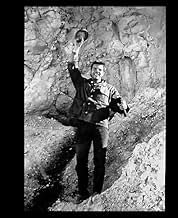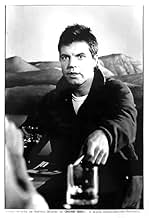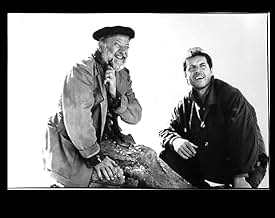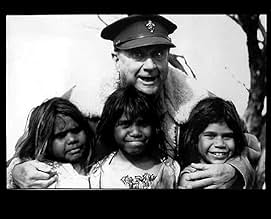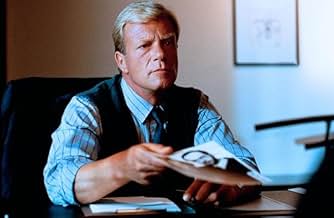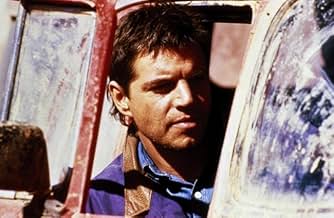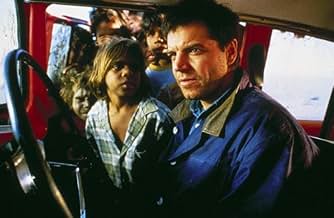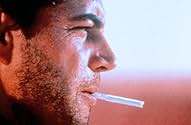An Australian cameraman inherits evidence his father witnessed a nuclear test's deadly impact on aborigines. His pursuit of justice risks angering powerful forces.An Australian cameraman inherits evidence his father witnessed a nuclear test's deadly impact on aborigines. His pursuit of justice risks angering powerful forces.An Australian cameraman inherits evidence his father witnessed a nuclear test's deadly impact on aborigines. His pursuit of justice risks angering powerful forces.
- Directors
- Writers
- Stars
- Awards
- 4 wins & 6 nominations total
- Directors
- Writers
- All cast & crew
- Production, box office & more at IMDbPro
Featured reviews
I'm surprised to find that this film has been seen (and appreciated) in America. It wasn't all that successful in Australia, most people felt (like me) that it was a great plot idea let down by the writing (I also found Colin Friels' performance a little flat - and I thought the film went a bit heavy on the anti-American angle).
However, these reviewers don't seem to quite know the background to the film. Britain's first atom bomb was tested on Monte Bello island in the Indian Ocean in 1956, but the next series of tests were carried out at Maralinga in the South Australian desert, at the invitation of the Australian government. There was nothing secret about this, the government actually used the tests to promote itself as looking after Australia's security. Sounds very familiar! At the time the movie was made (1987), there was a big issue over the radiation levels that Australian troops had been exposed to during the tests, and the effects on their long-term health (much the same as for US troops during the Nevada tests.) There were also questions raised about how much effort had gone into evacuating the local Aborigines from the area both before and after the tests. This is the issue that forms the background to the movie, but it is really about drawing parallels between Australian subservience to Britain in the 50's and to the USA in the 80's, and just how much this is really in Australia's interest.
The debate back then was over the US satellite facilities at Pine Gap, today it is over support for the war in Iraq. The movie should have been topical and relevant, then and now, but it isn't because it is done with such a heavy hand. The scene where Colin Friels and Donald Pleasance are suddenly ambushed by US troops in the middle of the Outback is just stupid. The scene where he is making the hot dog commercial is supposed to be about the domination of American culture, but it doesn't work either. The line where he is talking to the rat in his kitchen when he gets home, probably looked good on paper, but should have been cut from the movie. The final scene should be brilliant, but isn't. When Colin Friels says, 'Hey, wait a minute...' he shouldn't say anything! His face should say it all.
My opinion - this film isn't great, but it could have been, which is why I found it so disappointing. Close, but no banana - damn, another Americanism!
However, these reviewers don't seem to quite know the background to the film. Britain's first atom bomb was tested on Monte Bello island in the Indian Ocean in 1956, but the next series of tests were carried out at Maralinga in the South Australian desert, at the invitation of the Australian government. There was nothing secret about this, the government actually used the tests to promote itself as looking after Australia's security. Sounds very familiar! At the time the movie was made (1987), there was a big issue over the radiation levels that Australian troops had been exposed to during the tests, and the effects on their long-term health (much the same as for US troops during the Nevada tests.) There were also questions raised about how much effort had gone into evacuating the local Aborigines from the area both before and after the tests. This is the issue that forms the background to the movie, but it is really about drawing parallels between Australian subservience to Britain in the 50's and to the USA in the 80's, and just how much this is really in Australia's interest.
The debate back then was over the US satellite facilities at Pine Gap, today it is over support for the war in Iraq. The movie should have been topical and relevant, then and now, but it isn't because it is done with such a heavy hand. The scene where Colin Friels and Donald Pleasance are suddenly ambushed by US troops in the middle of the Outback is just stupid. The scene where he is making the hot dog commercial is supposed to be about the domination of American culture, but it doesn't work either. The line where he is talking to the rat in his kitchen when he gets home, probably looked good on paper, but should have been cut from the movie. The final scene should be brilliant, but isn't. When Colin Friels says, 'Hey, wait a minute...' he shouldn't say anything! His face should say it all.
My opinion - this film isn't great, but it could have been, which is why I found it so disappointing. Close, but no banana - damn, another Americanism!
Based on a true, despicable act by the British government inflicted on indigenous and uniformed Australians, Ground Zero charts the cover up over the outback nuclear testing and subsequent fallout which took place in the 1950's.
This is a superb dramatisation which embellishes on the actual Royal Commission which took place in the mid 1980's.
Melding actual events with a fictional aspect may invite warranted scepticism, but the way in which Ground Zero plays out is compelling and superbly crafted with commendable attention to detail. It may not be the absolute truth but there's enough evidence to suggest certain action sequences weren't beyond the realm of possibility.
The acting of Colin Friels, playing the central character, cameraman Harvey Denton, whose fictional father was murdered for the damning footage he captured at the time, is ably supported by Jack Thompson and Donald Pleasance. Their impact on the quality of this film cannot be understated.
Track it down on YouTube, I doubt you'll be disappointed.
This is a superb dramatisation which embellishes on the actual Royal Commission which took place in the mid 1980's.
Melding actual events with a fictional aspect may invite warranted scepticism, but the way in which Ground Zero plays out is compelling and superbly crafted with commendable attention to detail. It may not be the absolute truth but there's enough evidence to suggest certain action sequences weren't beyond the realm of possibility.
The acting of Colin Friels, playing the central character, cameraman Harvey Denton, whose fictional father was murdered for the damning footage he captured at the time, is ably supported by Jack Thompson and Donald Pleasance. Their impact on the quality of this film cannot be understated.
Track it down on YouTube, I doubt you'll be disappointed.
An intelligent thriller is a rare thing these days, at least on the evidence of this well-intentioned but pedestrian story of nuclear paranoia and bureaucratic conspiracy, in which an innocent Australian cameraman uncovers a few radioactive skeletons in the closet of his country's atomic testing program. The Aussie government apparently has been hiding the details about native Aborigine victims of radiation fallout, but because the secret is out at the beginning of the movie there's no surprise and very little suspense: each new development in the already linear plot is introduced in sequence, with handy cues of ominous music to help viewers connect the dots. The script relies too much on convenient expository bulletins (television news broadcasts; telephone answering machine messages; home movies and so forth), and identifies too strongly with its hero, who like any unassuming TV cameraman is transformed into James Bond when under stress. A strong cast and attractive wide screen photography can't hide the wasted opportunity to expose an ugly true story and turn it into compelling fiction.
While Ground Zero moved rather slowly at some points, the overall tone of the feature brought out a natural suspense that was both unique and different. While we Americans get caught up in the nuclear history of our own country, this film brought about a new perspective, albeit a darker and more sinister one.
Colin Friels had an exceptional performance in this movie, which few Americans seem to care about watching considering the low returns. The ending was also rather surprising, just when you felt the story had ended and everything was for naught. This is one of those forgotten eighties films that I'll be sure to remember.
Colin Friels had an exceptional performance in this movie, which few Americans seem to care about watching considering the low returns. The ending was also rather surprising, just when you felt the story had ended and everything was for naught. This is one of those forgotten eighties films that I'll be sure to remember.
Did you know
- TriviaAfter this movie was made, this film was specially screened at England's House of Commons Parliament for the British Government of the day.
- ConnectionsFeatured in Ground Zero: An Important Story - Jack Thompson in Conversation (2008)
- How long is Ground Zero?Powered by Alexa
Details
Box office
- Budget
- A$7,000,000 (estimated)
- Runtime1 hour 49 minutes
- Sound mix
- Aspect ratio
- 2.35 : 1
Contribute to this page
Suggest an edit or add missing content


